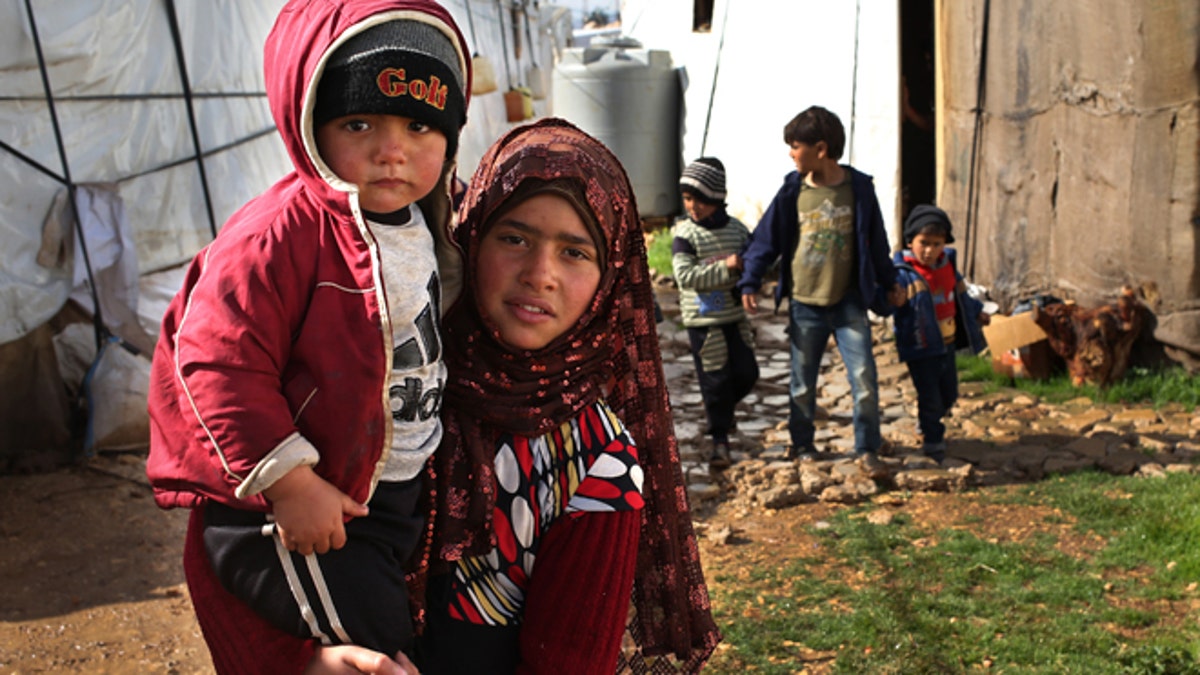
FILE -- March 12, 2014: A Syrian girl, foreground, carries her brother and walks between tents with other children, background, on their way to a makeshift school at their refugee encampment in the Lebanese-Syrian border town of Majdal Anjar, eastern Bekaa valley, Lebanon. More than 2 million of those who should be in school remain in Syria, where classrooms have been bombed, used as shelters or turned into military barracks. Another 300,000 Syrian children don’t attend school in Lebanon, along with some 93,000 in Jordan, 78,000 in Turkey, 26,000 in Iraq and 4,000 in Egypt, UNICEF officials in Geneva said. Those numbers likely are higher, as UNICEF can’t count the children whose parents didn’t register with the United Nations refugee agency. (AP Photo/Hussein Malla)
The slaughter in Syria began with children -- and continues with them. According to a new United Nations report, more than 10,000 Syrian children have died in the conflict, probably an underestimate, the U.N. concludes. Almost three million children in Syria and neighboring countries are unable to attend school, about half Syria’s school-age population. More than a third of Syrian children are no longer living in their homes or communities.
“Syria is now one of the most dangerous places on earth to be a child,” states the new report “Under Siege” a 20-page study by UNICEF, which describes in chilling statistics and anecdotal accounts the devastating impact of Syria’s three-year-old civil war on the most defenseless of victims.
[pullquote]
After so much turmoil and suffering, it is often forgotten that this vicious power struggle war began with the arrest and torture of 15 Syrian children in the southern city of Daraa for painting anti-government graffiti on the walls of a school.
The community's outrage over the children's mistreatment sparked riots that soon spread throughout Syria, as unarmed protesters refused to be cowed by President Bashar Assad’s thuggish security forces and demanded justice.
There seems no end in sight to such trauma. The report states that one in ten Syrian children – over 1.2 million – have become refugees in neighboring Arab countries.
By the end of January, 2014, 37,498 Syrian children had been born as refugees.
Those who remain inside Syria are subjected to bombings, shelling, hunger, and terror. Another earlier report notes that children as young as 11 have been arrested, some subjected to torture and sexual abuse to humiliate them, force confessions, or pressure their relatives to surrender.
“A narrow window of opportunity remains to protect this brutalized generation,” the “Under Siege” report warns.
In addition to abject hunger and starvation, doctors report what they call “hidden hunger,” dangerous vitamin and mineral deficiencies which have slowly undermined Syrian children’s ability to develop and thrive. Unless the slaughter and destruction stop, Syrian children face a “generational threat of irretrievable nutritional damage.”
There are fewer and fewer places left to treat these ailing children. UNICEF reports that 60 percent of Syrian hospitals have been destroyed or damaged. Fewer than a third of public ambulances and health centers are functioning; immunization rates have fallen across the country from 99 percent before the war to 52 percent in 2012. A third of Syria’s water treatment plants have been destroyed. Only a third of the country’s sewage is being treated. Polio, which was once eradicated in Syria, is returning.
UNICEF proposes a series of sensible steps to “make this the last year of suffering” for Syria’s children, including calling on all parties to permit UNICEF and other humanitarian agencies to deliver vitally needed food, medicine and aid to children in areas under siege. But their sound pleas are likely to go unheeded by all of the warring sides.
The most we can do is read their reports, weep, and write a check.
UNICEF is seeking $276 million in funds for its education work this year – double the amount of last year -- and $110 million to train teachers committed to trying to save what threatens to be a lost generation.
On Tuesday, the Obama administration effectively shuttered the Syrian embassy in Washington by ordering Damascus to suspend its diplomatic and consular missions in the U.S. But U.S. officials moved only after Syrian President Bashar Assad' suspended consular services for Syrians living in the U.S.
President Obama long ago rejected the type of humanitarian intervention for which Samantha Power, his ambassador to the United Nations, once so passionately and persuasively called for before taking up her current post in his administration.
He has also rejected a serious campaign to arm the "moderate" rebels, as they have proven as quarrelsome and feckless as their critics have claimed. Perhaps, had the U.S. provided those forces with support and guidance earlier, they might have been able to prevent the domination of the rebel cause by Al Qaeda and other like-minded Islamic militants, America's enduring foes.
But such second-guessing now serves no point. At this stage, there seem to be few good options for stopping the ongoing slaughter of combatants and innocents alike.
Republicans (and some Democrats) were right to blast Obama for having backed away from his impromptu declaration of a “red line” against Syria’s use of chemical weapons on his own citizens.
Russia saved Obama political embarrassment by embracing Secretary of State John Kerry’s demand that Syria give up its chemical arms and leaned on Damascus to give up those WMDs. But disarming Syria of such monstrous arms -- a positive development, to be sure -- will not stop the regime from dropping barrel bombs on children in rebel-held areas, nor will it prevent the rebels from slitting “infidel” throats and killing more innocent children in their own vicious struggle for power.
The war seems destined to rage on, until one side wins or exhaustion brings the warring factions to the negotiating table in earnest. That, too, seems many more deaths away.
